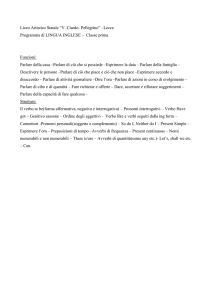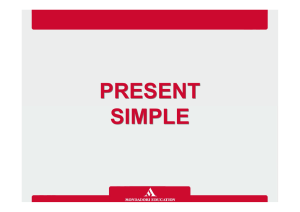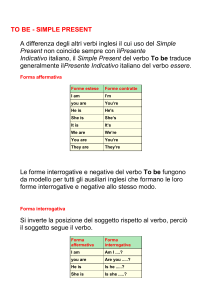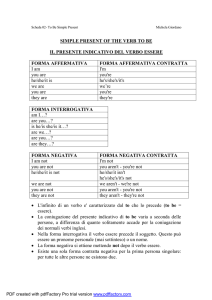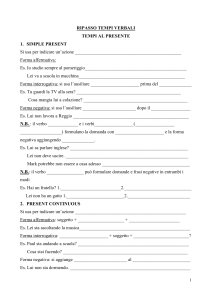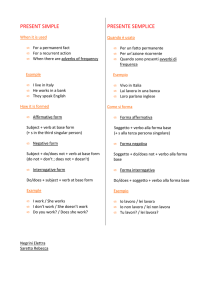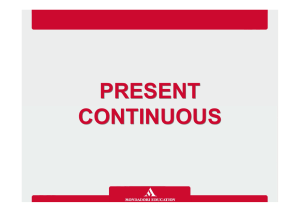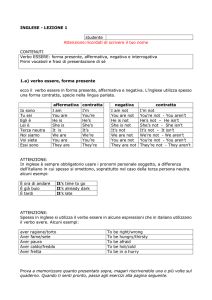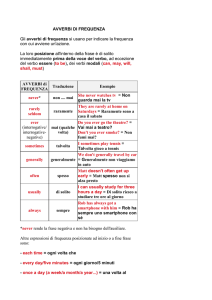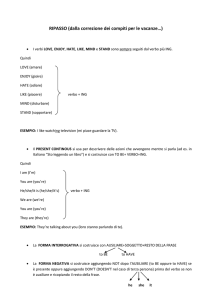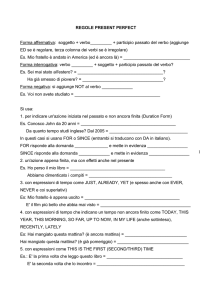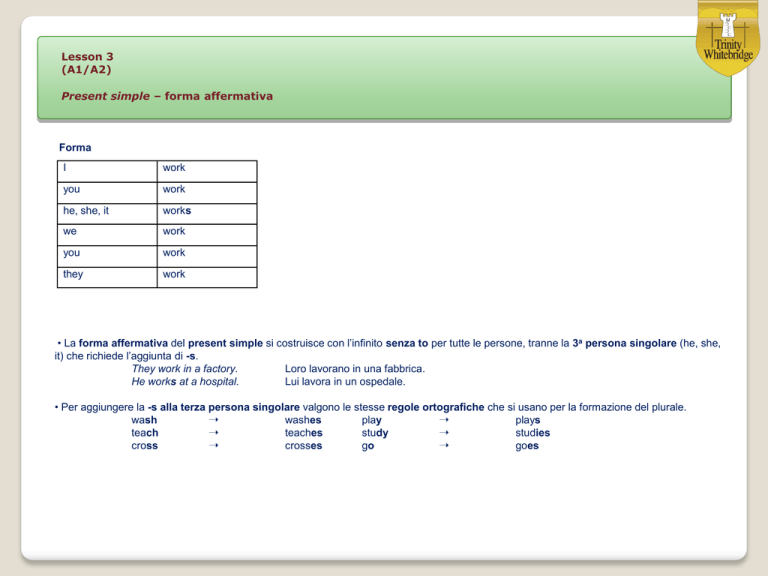
Lesson 3
(A1/A2)
Present simple – forma affermativa
Forma
I
work
you
work
he, she, it
works
we
work
you
work
they
work
• La forma affermativa del present simple si costruisce con l’infinito senza to per tutte le persone, tranne la 3a persona singolare (he, she,
it) che richiede l’aggiunta di -s.
They work in a factory.
Loro lavorano in una fabbrica.
He works at a hospital.
Lui lavora in un ospedale.
• Per aggiungere la -s alla terza persona singolare valgono le stesse regole ortografiche che si usano per la formazione del plurale.
wash
➝
washes
play
➝
plays
teach
➝
teaches
study
➝
studies
cross
➝
crosses
go
➝
goes
Lesson 3
(A1/A2)
Present simple – forma affermativa
Quando si usa
Il present simple si usa:
• per parlare di azioni abituali o ricorrenti (azioni di “routine”):
I usually get up at seven o’clock.
Di solito mi alzo alle sette.
• per affermazioni di tipo generale:
I like music.
Mi piace la musica.
• per leggi della natura e fatti sempre veri:
The sun rises in the east.
Il sole sorge a est.
• con funzione di presente narrativo:
Finally, they fall in love and get married.
Infine si innamorano e si sposano.
Lesson 3
(A1/A2)
Avverbi ed espressioni di frequenza
Avverbi di frequenza
0%
100 %
never/ever
seldom/rarely
sometimes
often
usually/generally
always
mai
raramente
talvolta
spesso
di solito/generalmente
sempre
• Posizione nella frase:
• prima del verbo
• tra l’ausiliare e il verbo
• dopo il verbo to be
• sometimes
può trovarsi anche all’inizio o alla fine della frase.
Attenzione!
• never
• ever
We always meet our friends.
They don’t often eat meat.
She is always late.
è negativo. In inglese non vi possono essere due negazioni nella stessa frase, pertanto il verbo va espresso in forma
affermativa.
I never go to bed before midnight.
Non vado mai a letto prima di mezzanotte.
è usato in frasi interrogative
e affermative
Do you ever buy CDs?
This is the best book I’ve ever read.
Lesson 3
(A1/A2)
Avverbi ed espressioni di frequenza
Espressioni di frequenza
once a day/week/month/year
una volta al giorno/alla settimana/al mese/all’anno
twice a day/etc…
due volte al giorno/ecc…
three/four times a day/etc…
tre/quattro volte al giorno/ecc…
every day/etc….
ogni giorno/ecc…
every two days/etc…
ogni due giorni/ecc…
many times
molte volte
several times
parecchie volte
• Posizione nella frase: al termine della frase. I go to the cinema about twice a month.
• Osserva l’utilizzo dell’articolo indeterminativo a: once/twice a month.
Quando si usano
Vengono usati per esprimere la frequenza con cui un’azione viene svolta.
Rispondono alla domanda How often…?
I go to the pub twice a week.
Vado al pub due volte alla settimana.
How often do you go to the cinema? - Never.
Quanto spesso vai al cinema? - Mai.
EXERCISE 1
Qui abbiamo delle frasi alla 3a persona singolare del present simple. Alcune sono corrette, altre sono sbagliate.
Cerchiamo il present simple in verde se è corretto.
Cerchiamolo in rosso se è sbagliato.
Motiviamo la scelta e correggiamo gli errori.
1.
David plaies tennis once a week.
2.
Colin studies hard every day.
3.
Margaret only watches TV at weekends.
4.
Colin knowes a lot of people.
5.
Mrs Adams puts the children to bed at eight o’clock.
6.
Tom gos jogging on Saturdays.
7.
Mr White teaches maths.
8.
David speakes three languages.
EXERCISE 2
Completiamo queste frasi con la forma affermativa del present simple del verbo appropriato al contesto.
1.
I .................... Economics at university and my sister .................... Law.
2.
David .................... work at 8.00, but we .................... at 8.30.
3.
Colin .................... the guitar and I .................... the drums.
4.
Betty and Mark .................... from the USA, but Robert .................... from
Canada.
EXERCISE 3
Queste sono le abitudini quotidiane di Jenny.
Indichiamo con un pallino verde dove vanno collocati gli avverbi e le espressioni di frequenza forniti a lato.
1.
Jenny gets up at 7.30.
usually
2.
She has a quick shower.
always
3.
She has cereal for breakfast.
normally
4.
She is late for work.
never
5.
She goes straight back home after work.
rarely
6.
She meets friends or goes shopping.
often
7.
She goes to the gym.
8.
She also goes to the swimming pool.
9.
She goes to the cinema in the evening.
10.
She is tired.
twice a week
once a week
sometimes
rarely
EXERCISE 4
Riordiniamo le parole fornite in ordine sparso e costruiamo frasi di senso compiuto.
Prima di tutto identifichiamo il soggetto e cerchiamolo in verde. Poi identifichiamo il verbo e sottolineiamolo in un altro
colore. Infine identifichiamo l’avverbio o l’espressione di frequenza e sottolineiamolo in un altro colore ancora. Dove va
collocato?
1.
rude / Tom / often / is
2.
…………………………………………………………………………………………..
the / go / I / to / never / disco
3.
…………………………………………………………………………………………..
snows / it / here / rarely
4.
…………………………………………………………………………………………..
jogging / Tom / Clare / and / every morning / go
5.
…………………………………………………………………………………………..
the / always / film festival / on 20th / starts / August
6.
…………………………………………………………………………………………..
to / Kevin / the / twice a week / goes / gym
…………………………………………………………………………………………..

